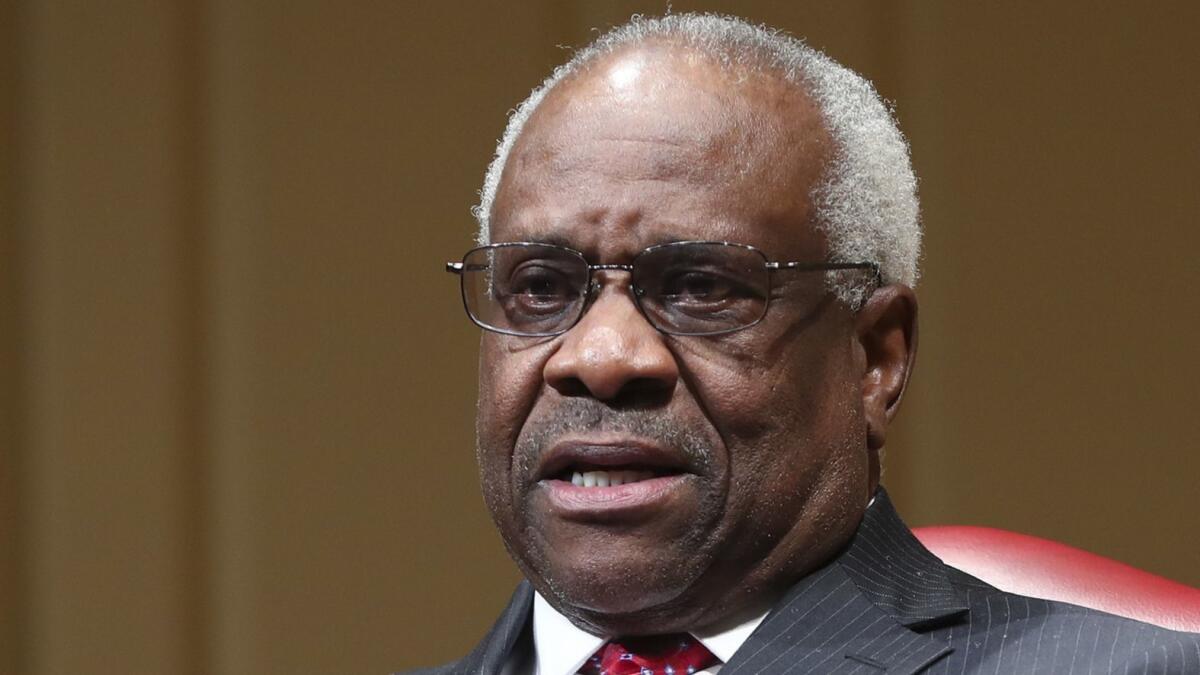Clarence Thomas agrees with Trump that libel laws should be eased

Reporting from Washington — Justice Clarence Thomas filed a solo opinion Tuesday that should appeal to President Trump. He said the high court should make it easier for public figures to sue for libel.
Thomas said the court made a mistake in 1964 when it set a high barrier for public officials to sue the press for defaming them with a false story. That was later expanded to include famous individuals and people who inject themselves into big news stories.
In essence, public officials must show the publishers knew the report was false or otherwise displayed a “reckless disregard” for the truth.
Thomas argued that the framers of the Constitution did not intend such protection when they adopted the 1st Amendment, which forbids “abridging the freedom of speech or of the press.”
“We should not continue to reflexively apply this policy-driven approach to the Constitution,” he wrote in McKee vs. Cosby. At some time, “we should reconsider our jurisprudence in this area.”
Trump has repeatedly called for such a change.
“Our current libel laws are a sham and a disgrace and do not represent American values or American fairness,” he said early last year at the start of the Cabinet meeting. He was upset then by a headline-making book by Michael Wolff called “Fire and Fury: Inside the Trump White House.”
The president called for change in the law. “We are going to take a strong look at our country’s libel laws, so that when somebody says something that is false and defamatory about someone, that person will have meaningful recourse in our courts,” he said.
Libel and defamation are claims that are brought under state law. But if the federal shield against such claims were relaxed, the impact could go far beyond the press. Critics have noted President Trump could be vulnerable himself due to his blunt postings on Twitter where he has called rivals “crooked,” “dishonest” and “criminal.”
Thomas is not the first justice to question the court’s 1st Amendment standard. In the past, the late Justice Antonin Scalia had called for reconsidering the landmark New York Times vs. Sullivan decision in 1964, which sharply limited defamation claims in state court.
In that case, an Alabama county commissioner had sued the New York Times over an advertisement that sought funding for Dr. Martin Luther King and his civil rights campaign. L.B. Sullivan, the county official, was not mentioned in the ad, but he said he was defamed nonetheless because it referred to police abuses and an “unprecedented wave of terror.”
The Alabama courts awarded him $500,000 in damages, but the Supreme Court unanimously reversed the judgment.
The justices then believed the national press could not cover the civil rights movement in the South if newspapers, magazines and TV networks were subject to crippling libel verdicts in state courts.
And despite Scalia’s comments, the high court did not move to reconsider the landmark ruling in his nearly 30 years on the court. None of the other justices signed on to Thomas’ 14-page opinion.
More stories from David G. Savage »
More to Read
Get the L.A. Times Politics newsletter
Deeply reported insights into legislation, politics and policy from Sacramento, Washington and beyond. In your inbox three times per week.
You may occasionally receive promotional content from the Los Angeles Times.











